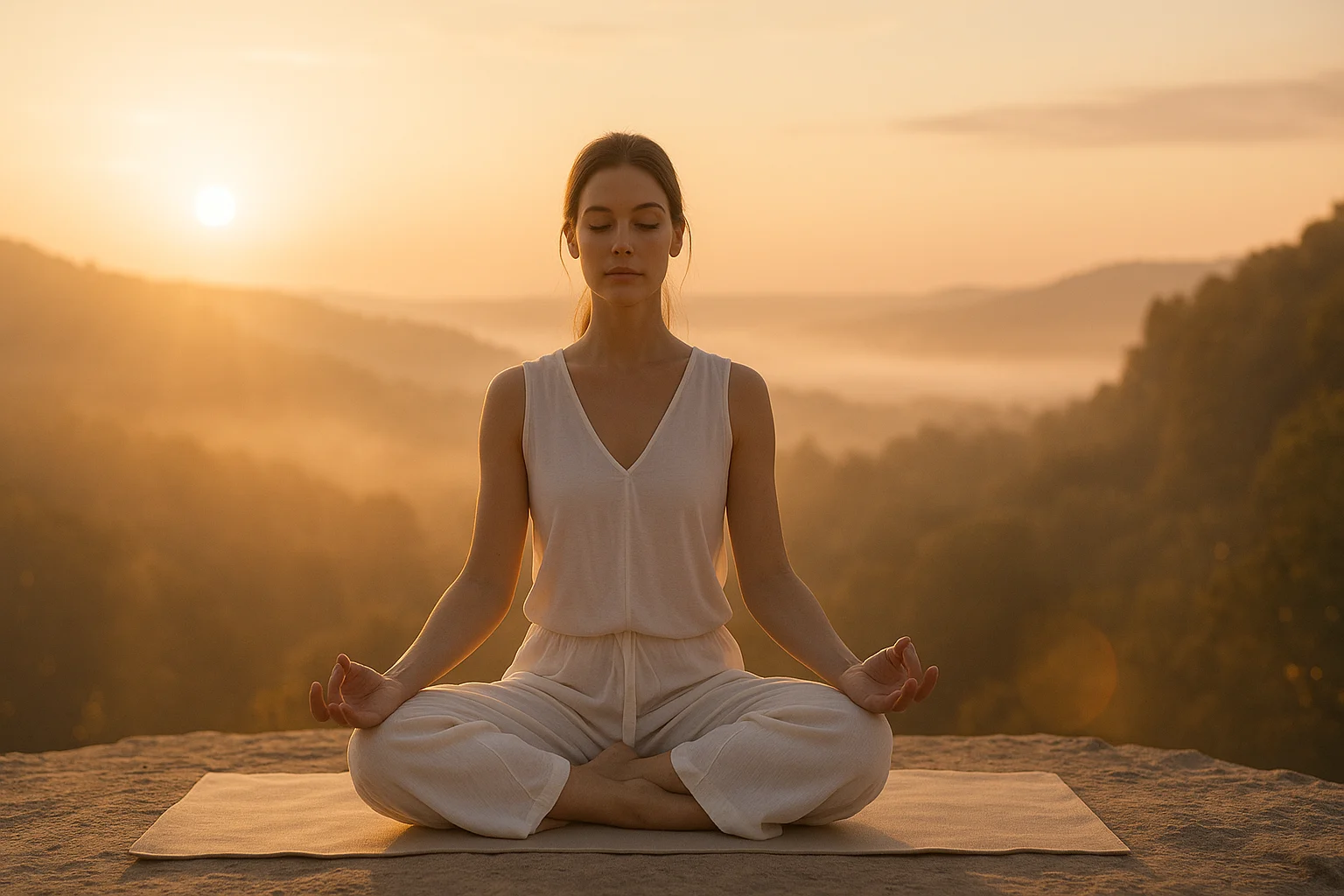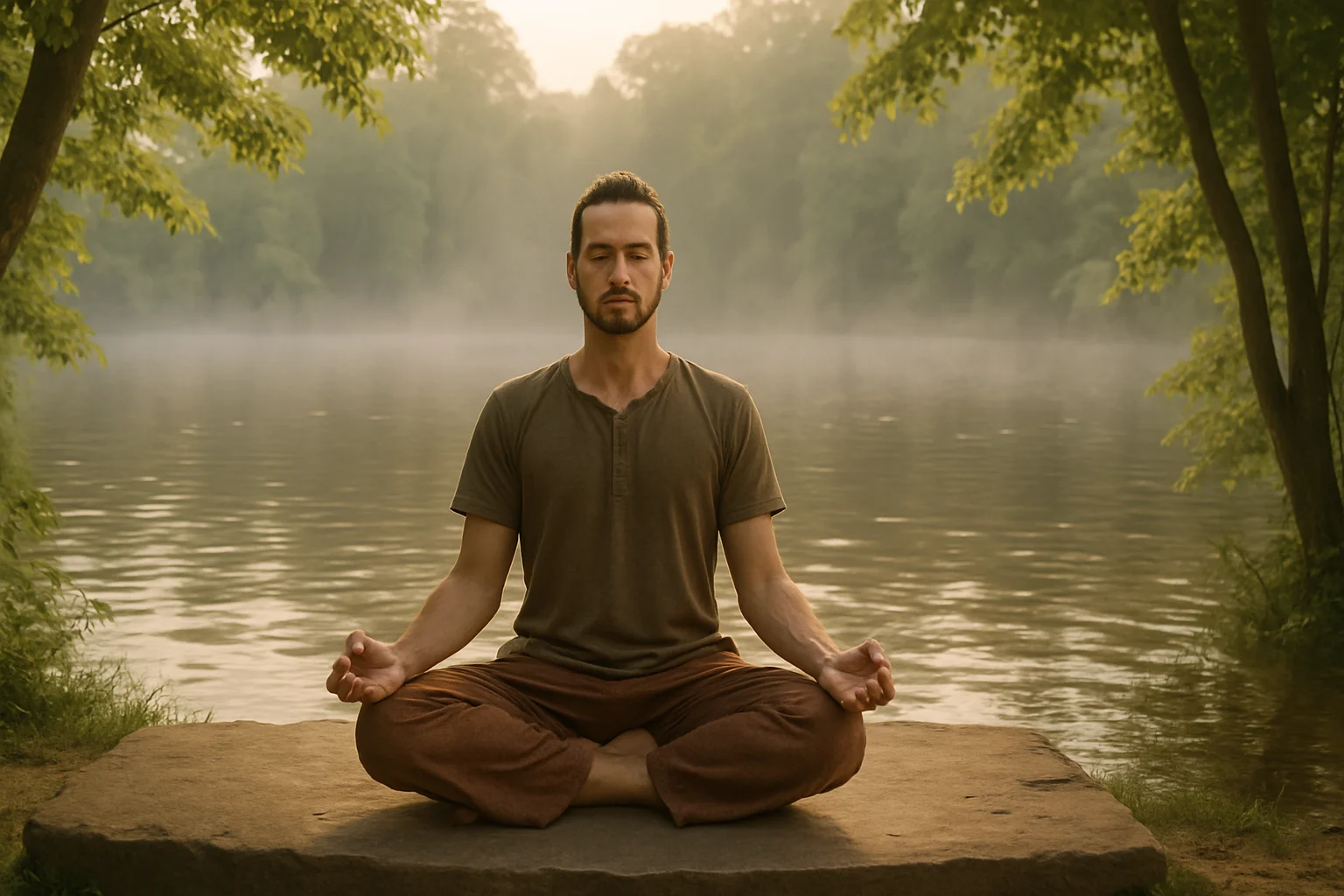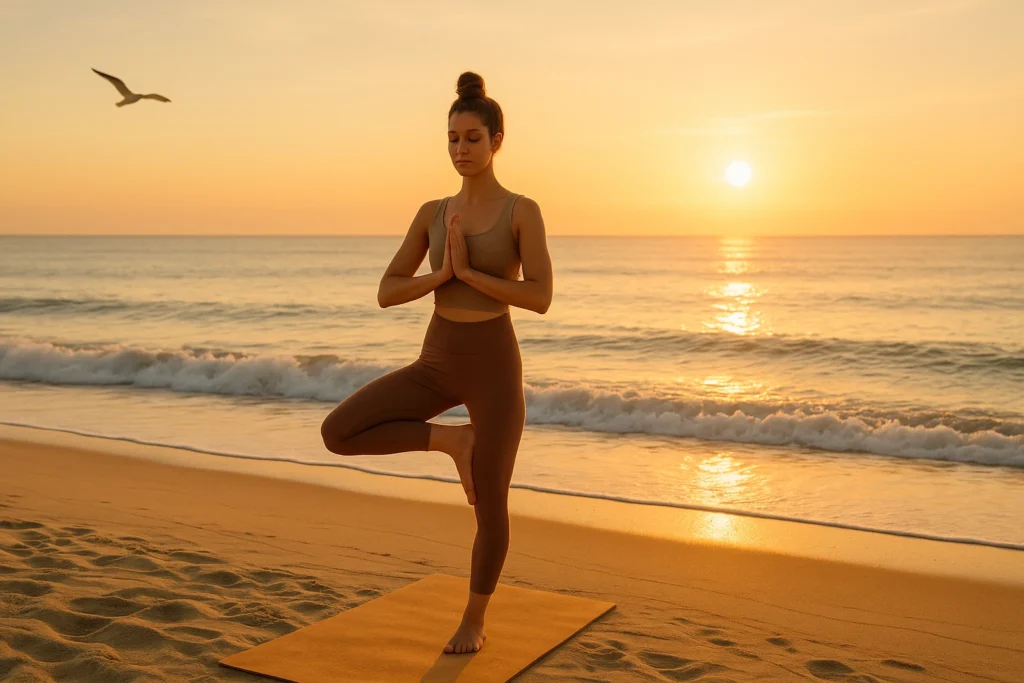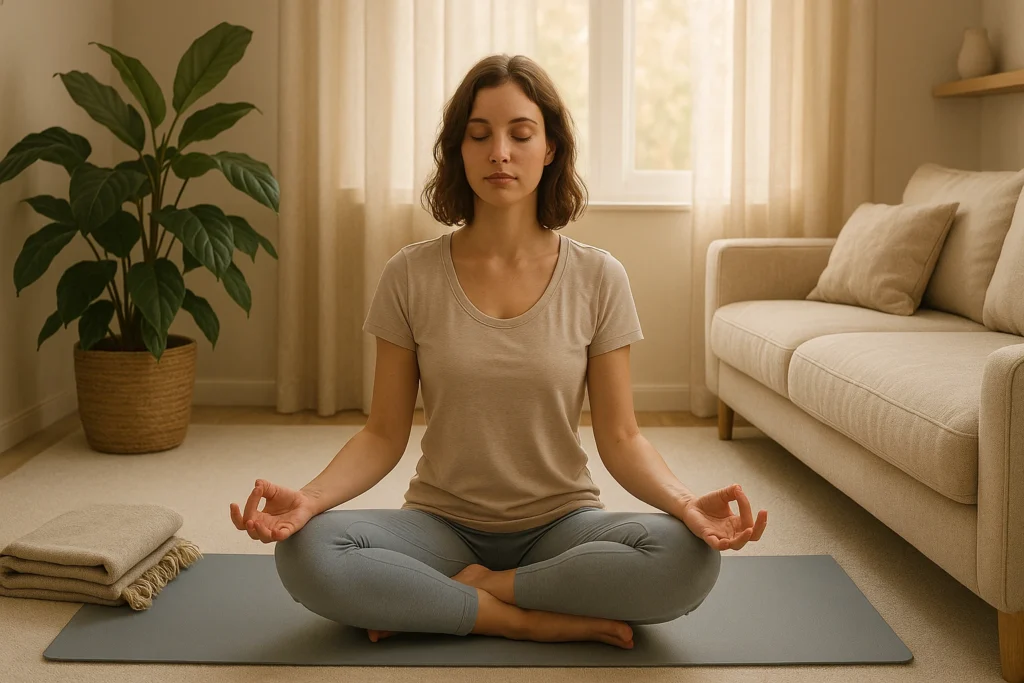
Note: We don’t currently offer a full course. This page is a free guide and quiz to help you explore yoga philosophy.
Looking for a yoga philosophy course? Feel that spark when you roll up your mat, like there’s more to uncover? Yoga philosophy basics have pointed to a calmer, fuller life for over 2,000 years. We don’t offer a course ourselves, but this free guide and quiz will help you explore what a course like this can offer—beyond poses, it’s a path to wisdom that can shift how you live, think, and maybe even teach. You’ll learn the benefits, what’s included, and how to choose one, all complementing our broader yoga philosophy guide. Ready to jump in?
Discover Your Yoga Path!Table of Contents
- Why Studying Yoga Philosophy Matters
- What’s in a Yoga Philosophy Program?
- Unpacking the Core Texts
- Who Benefits from Studying Yoga Philosophy?
- Benefits of Studying Yoga Philosophy
- Yoga Philosophy Basics in Modern Life
- Course Formats
- Choosing Your Yoga Philosophy Course
- Are You Ready? (Quick Quiz)
- Stories of Transformation
- Frequently Asked Questions
- Embrace Yoga’s Full Wisdom
This post has affiliate links. We may earn a commission. Learn more.
Why Studying Yoga Philosophy Matters
Imagine a tree: its branches are the poses you love, but the roots—yoga’s philosophy—keep it grounded. A course like this digs into those roots, tying your mat to your everyday life.
You might’ve started yoga for a stronger body or a bit of calm—awesome first step! But the old yogis had more in mind: understanding yourself, the world, even finding real peace. Sticking to poses alone skips the good stuff. Ever wonder why a pose is called “warrior” or how deep breaths (pranayama) do more than just chill you out? A yogic philosophy training unlocks those answers, leveling up your practice.
Plus, it hands you tools like Dharma (your purpose) or Ahimsa (kindness) to tackle stress, relationships, or life’s big “what’s it all about?” moments. As Jigar Gor said, “Yoga is not just about touching your toes, it’s about what you learn on the way down.”
What’s in a Yoga Philosophy Program?
This kind of course dives into yoga’s intellectual and spiritual core. Instead of perfecting poses, you explore ancient teachings that explain why you practice. These courses unpack the ideas behind practice and ethics—think of it as a pocket guide you can actually use between classes.
Core Topics to Help You Learn Yoga Philosophy
- Yoga Sutras of Patanjali: A roadmap to self-realization via the Eight Limbs.
- Bhagavad Gita: A dialogue on duty, action, and devotion.
- Vedanta & Upanishads: Insights into reality and the self (Atman, the inner spark).
- Yamas & Niyamas: Ethical guidelines like truthfulness and contentment.
- Karma and Dharma: Cause, effect, and your unique purpose.
- Meditation and Mindfulness: Techniques for a calm, focused mind.
- Yoga’s History: From ancient roots to modern practice.
Think of it as a wise mentor sharing timeless insights. You’ll not only learn these ideas but also apply them daily. For a deeper look, check out resources from Yoga Journal’s philosophy section.

Unpacking the Core Texts
If you’re skimming, here’s the heart of it: These texts aren’t dusty relics—they’re living guides. Here’s what you’ll study.
Yoga Sutras of Patanjali
Written around 200 CE, Patanjali’s 195 sutras are yoga’s blueprint. The Eight Limbs (Ashtanga Yoga) outline a path to peace:
- Yamas: Ethics like non-violence (Ahimsa) and truth (Satya).
- Niyamas: Self-practices like contentment (Santosha).
- Asana: Physical poses you know.
- Pranayama: Breath control for energy.
- Pratyahara: Turning inward.
- Dharana: Concentration.
- Dhyana: Meditation.
- Samadhi: Blissful oneness.
The Sutras show how poses fit into a bigger journey to inner freedom.
Bhagavad Gita
This epic poem, part of the Mahabharata, features Krishna guiding warrior Arjuna through a moral crisis. It explores:
- Dharma: Acting with purpose.
- Karma Yoga: Selfless action.
- Bhakti Yoga: Devotion.
- Jnana Yoga: Wisdom through inquiry.
It’s a timeless guide for acting wisely in chaos.
Vedanta & Upanishads
Vedanta, drawn from the Upanishads, explores reality. Key ideas include:
- Brahman: Universal consciousness (the cosmic glue).
- Atman: Your true self, one with Brahman.
- Maya: The illusion of separateness.
These teachings reveal life’s unity, fostering peace and fearlessness.
Who Benefits from Studying Yoga Philosophy?
Anyone curious about yoga’s deeper layers can benefit, whether you’re a beginner or a teacher.
Practitioners Seeking Depth
Feel like yoga’s more than poses? Studying yoga’s philosophy helps you understand its emotional and spiritual shifts, offering tools for stress, relationships, or purpose.
Yoga Teachers
Teachers gain authenticity, confidence, and depth. You’ll answer student questions, create meaningful classes, and teach with purpose, not just poses.
Curious Minds
Love ancient wisdom? These universal teachings apply to anyone seeking a fulfilling life, no yoga mat required. It’s not about being a guru—just growing wiser.
Benefits of Studying Yoga Philosophy
A well-structured yoga principles course can transform your practice and life. Here’s how.
For Your Practice
- Mindfulness: Understand why breath and focus matter, boosting presence.
- Deeper Poses: Asanas become moving meditations with symbolic meaning.
- Ethical Living: Yamas/Niyamas (like a compass for life) guide relationships and choices.
- Resilience: Karma and impermanence teachings ease anxiety.
- Self-Awareness: Atman insights reveal your true self.
Example: Sarah, a busy professional, used Santosha (contentment) from her course to find joy in small moments, reducing stress.
For Teachers
- Authenticity: Share yoga’s deeper meaning.
- Student Engagement: Answer life questions with wisdom.
- Creative Classes: Theme sessions around philosophy.
- Confidence: Grounded knowledge prevents burnout.

Yoga Philosophy Basics in Modern Life
Two ideas to try this week: These ancient teachings shine in today’s world. For example, apply Ahimsa to workplace conflicts by choosing kindness over anger. Try a 10-minute ‘Santosha scroll pause’ after lunch—breathe, notice one thing you appreciate, then come back to your phone. Karma Yoga inspires volunteering without expecting rewards, fostering community. Ayurvedic daily practices grounded in yoga philosophy equip you to live these principles.
Optional: Self-Study Check-In
Curious how new habits affect sleep & stress? Get a simple at-home snapshot now and revisit after your study month.
Get your kit Partnered
Use code Max15 for 15% off sitewide.
Not medical advice; consult a healthcare professional for personal guidance.
Course Formats: Find Your Fit
Choose a format that suits your life.
Online Courses
Flexible and affordable, online courses offer videos, forums, and live Q&As. Study at your pace, anywhere.
In-Person Workshops
Enjoy immersive learning with direct teacher interaction and community energy.
Retreats
Intensive retreats combine study, yoga, and meditation in serene settings for deep transformation.
Choosing Your Yoga Philosophy Course
Consider:
- Curriculum: Covers your desired texts?
- Instructor: Experienced and engaging?
- Format: Fits your schedule?
- Accreditation: Offers CE credits (e.g., Yoga Alliance Continuing Education (YACEP))?
- Cost: Matches your budget?
- Reviews: Positive student feedback?
Are You Ready? (Quick Quiz)
Take this quick quiz to find out where you stand.
Yoga Philosophy Readiness Quiz
Answer one question at a time to gauge your readiness.
1. Is yoga more than just physical poses for you?
Stories of Transformation
Philosophy changes lives. Here are real examples.
Mark, the Stressed Executive
Mark, 45, used yoga to ease work stress but felt stuck. Studying yoga philosophy taught him Ahimsa (non-violence) and Santosha (contentment). When Slack lit up at 9:01, he took one breath before typing. Same boss, fewer spirals. “It didn’t change my boss,” he said, “but it changed how I respond.”
Priya, the Aspiring Teacher
Priya, in her 200-hour training, felt overwhelmed. Studying the Bhagavad Gita’s Karma Yoga (selfless action) freed her from perfectionism. She now teaches with joy, focusing on service. “It’s not about me,” she said. “It’s about my students.”
Anna, the Beginner Yogi
Anna, new to yoga, joined a yoga philosophy course to find balance in her hectic life. Learning Svadhyaya (self-study) helped her journal daily, uncovering her values. “I’m calmer and more focused,” she shared, “and I make choices that feel true to me.”
Frequently Asked Questions
Embrace Yoga’s Full Wisdom
Your yoga journey began with poses, but a yoga philosophy course can unlock its full potential. It’s not just about texts—it’s about knowing yourself and living with purpose. Whether online, in-person, or at a retreat, this journey transforms your practice into a path of peace. Ready to put the ideas into practice and dive in? The wisdom awaits! 🌟
Disclaimer: Yogic philosophy studies may involve practices that affect mental and emotional well-being. Consult a healthcare professional if you have concerns about your health before starting.


